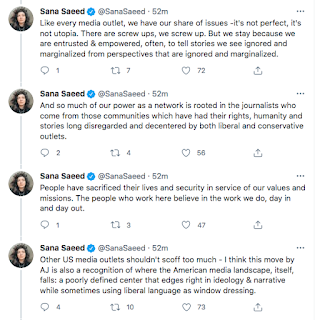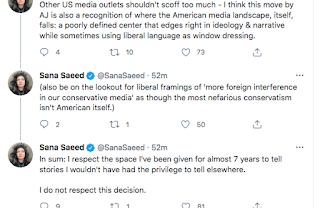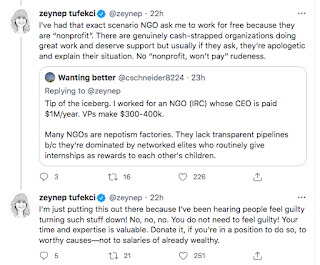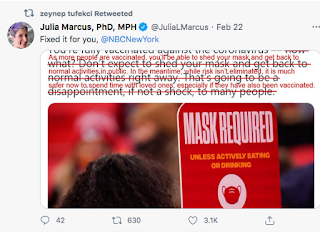Nelson Lowhim's Blog, page 48
March 1, 2021
Cool Aht.
Enjoyed it? Share it via email, facebook, twitter, or one of the buttons below (or through some other method you prefer). Thank you! As always, here's the tip jar. paypal.me/nlowhim Throw some change in there & help cover the costs of running this thing. You can use paypal or a credit card.


February 28, 2021
Ukraine and Color Revolutions.
The main gestation from this issue comes from Belarusian protests and how those, compared to the more right wing and more violent (and more "ginned up" by the likes of US proxies) ones in Bolivia and Nicaragua. Not all protests are the same. And, in fact, not all statements by the likes of US State Dept types necessarily mean that something is amiss (IOW, though it might not be the worst rule of thumb, just because the US backs the protest in Belarus, doesn't mean they are fake int he sense that the protests that the US backed in Bolivia were certainly a right wing coup).
As concerns Latin America, it certainly seems that history is an easy way to measure most actions there and that if the US backs it, it has a high probability of being not the kind of movement that's a power to the people moment. But one must always look at the facts and read through the trite statements for the MSM here in the US to get at some better version of reality.
So I tried to think back to other even that started with much of the Russiaphobic (and to this day on left sites so many think of Trump, despite what he's done to ratchet up tensions between the US and Russia—see the doomsday clock and how we really are racing to the precipice—and other factors like pulling out of the peace deal with Iran) talk here in this country.
Yeah, fuck Trump, but some of this stuff, coming from Neo cons and Neo-liberals who like some hand holding with Neo cons when it comes to a lot of policy, is some stupid shit.
So here's my view on the Ukraine issue: a protest movement started and it's very possible that it had the worst elements of Ukraine, to include Nazis and right wingers (who I just don't trust). This all was quite possibly started by the US State Dept and some Ukrainian oligarchs all feeding these nationalists (anti-Russian and many other things). But I do think there was an element of real anger at the then leader... I actually don't know how much of that was the crazy right wing nationalists and no one seems to have a solid answer on that. Again, I'm gonna go with crazy Nazis were a big part of that protest movement and yea, I don't give a fuck about Nazis protesting (over the move away from Europe even though the deal with Europe was a bad one). Okay, but what after that?
I really don't sense, other than losing Crimea, that Russia was over reacting to a possible US incursion into their theater of influence.
Here's a good article in the LRB on it. It doesn't get into the nitty gritty of what exactly happened at first, but this seems right to me:
Moscow’s vehement reaction to the Maidan is rooted in a rejection of all unlicensed upheavals in the post-Soviet space, and it initially backed the Donetsk and Lugansk protesters as trusty counter-revolutionary forces. But it neglected the possibility that they too might take a populist turn, amid the corrosion of the Ukrainian oligarchic system that Yanukovych’s fall had laid bare. Those who seized the regional administration building in Donetsk did so in large part out of frustration with their elected officials’ inertia in the midst of crisis: the Party of Regions seems to be caught between ideological loyalty to Russia and attachment to its parliamentary seats in Kiev. Freed of the electoral imperative to support the president against the Ukrainian nationalists, the protesters in the east soon turned against the increasingly discredited Party of Regions as representative of a system that had fleeced them no less than it had their compatriots to the west. One result of this is that the party’s candidate in the presidential elections, Mykhailo Dobkin, was reportedly polling a measly 11 per cent in what used to be its eastern stronghold.
One of the most striking features of the pro-Russian movements in eastern Ukraine, in fact, has been the institutional vacuum in which they have operated. In the absence of recognisable political parties that might channel their demands – but also defang them – the rough-and-ready methods of popular assemblies have taken hold; hence, too, the improvised character of the 11 May referendums. Whatever their level of support in Ukraine, these movements, combining nationalist appeals to Russian ethnicity and tradition with rebellious impulses to self-organisation, set an example Putin has no more desire to see emulated in Russia than he did the Maidan. This is another reason why he sought to distance himself from the referendums, and why he might prefer to see Turchynov crush the ‘people’s militias’ than see them succeed: they are not the natural allies but the enemies of an oligarchic order whose local representatives are billionaire industrialists like Akhmetov and Serhiy Taruta, appointed governor of Donetsk by Kiev in early March, and whose Russian champion is Putin himself. It seems significant that, according to the mid-April poll by the Kiev International Institute of Sociology, close to 40 per cent of respondents in Donetsk and a quarter of those in Lugansk favoured nationalisation of all property belonging to the country’s oligarchs. It’s striking, too, that while many other Ukrainian oligarchs sided with the new government in Kiev early on, Akhmetov, with business interests in Russia and export markets in the West, hedged his bets until mid-May, when he suddenly came out firmly against the separatists as ‘terrorists’ and ‘marauders’ and encouraged his employees to sign up for volunteer patrols. Looking at the barricades in Slavyansk, Kramatorsk and Donetsk, past the flags and symbols to the people manning them, he may quietly have made the same calculation as Putin, and realised which side he was ultimately on.
Russian nationalists have taken to calling the Donetsk and Lugansk revolts a ‘Russian Spring’. The analogy with the Arab uprisings is misplaced – the revolts have happened outside Russia and the regime equivalent to Mubarak’s or Ben Ali’s is still in power. But if what befell them were to be repeated in Moscow, Putin’s very success in monopolising the political system and stifling dissent would mean that he left behind him an institutional landscape as empty as that in eastern Ukraine. In that sense, the streets of Donetsk offer one vision of what a ‘Russia without Putin’ might look like. Perhaps the fear of falling into this abyss, felt by oligarchs on all sides, will be enough to stop Ukraine from going over the edge. But this close to the brink, not everyone can be relied on to keep their balance.
I sense that I agree with this. It's sad that in the end the oligarchs will win, even those who stole so much from these nations, and whether or not they are all in with the West seems a moot point to me.
And yet here's another good article in the LRB.
It starts right with the two views that permeate the world:
This is what it looks like from the West. A post-Soviet republic holds a presidential election which a candidate from the east of the country with criminal backing attempts to steal, provoking a popular uprising, a rerun of the election and the victory of his opponent. Six years later the eastern candidate wins the presidency against a divided opposition, jails his main opponent on trumped up charges, moves members of his clan into key positions, and amasses a huge fortune.
Under Russian pressure, the new president betrays an election promise to sign an agreement with the European Union, provoking another popular uprising. The police attack the protesters, and their numbers swell. The president pushes through draconian laws against the demonstrators. Evoking a heroic tradition of resistance to occupation by Nazis and communists, militant protesters attempt to march on parliament, battling the police, who respond by murdering more than a hundred people. Despite reaching an agreement to de-escalate the conflict, the president flees, a new government is temporarily appointed and subsequently a new president and parliament are elected. The Russians use the departure of the president and the appointment of the new government as an excuse to annex one part of the country and to invade another.
This is how they see it from the other side. Following a disputed election result, a pre-planned uprising backed by Western intelligence in a former part of the Soviet Union forces the judiciary to rerun an election. The winner presides over a factious and sectarian administration, every bit as corrupt as its predecessor, and it’s no surprise that the previously ousted winner is properly re-elected six years later. He refuses to sign an agreement with the Western powers that would have impoverished swathes of the population, particularly in the formerly industrial regions of the east and south.
In response to this decision, protesters, again backed by Western intelligence agencies, occupy the central square, paralysing the capital. After nearly two months, parliament passes emergency measures to bring the protests under control, provoking radicals from two neo-fascist parties – consciously emulating wartime Nazi collaborators – to attack the police. Sniper fire from the protesters leads to a counter-attack. Following the collapse of police resistance, a junta is imposed, which includes several members of one of the neo-fascist parties, while the other group spreads out across the country, threatening and in some cases killing those who support the elected government. For its own protection, one part of the country votes overwhelmingly to join Russia while, in another, a popular uprising against the Western-backed fascist junta leads to the creation of two independent people’s republics. They are attacked by fascist militias, and volunteers from Russia come to their aid.
Yeah, I think those are the best 2 narratives on this.
Andrew Wilson had already written an effective narrative of the 2004 uprising in Ukraine’s Orange Revolution (2005), where he acknowledged that the protests against Yanukovich’s fraudulent 2004 election were pre-planned (exit polls, steward training, the building of a stage for a rock concert in the main square, the erection of six hundred tents), but ‘then so was the fraud that led to them.’ He accepts that Western NGOs advised and helped to organise the protests, but why not? The West was promoting its democratic values, for which it had no reason to apologise, and the protesters needed money from somewhere: ‘Without it, they would have lost.’ The Orange Revolution was a genuine popular demand for a change of regime and – despite Yushchenko’s insider credentials – its result a great deal more than an exchange of elites.
HUh, but one can see the reason for paranoia if it was indeed helped but how much would any western country agree to this happening in their own borders (and, again, there's the issue of saying, say BLM is getting Soros money. Okay, I'm not sure but maybe they are, and maybe the Tea Party gets Koch money, but how much of a boost is that? It's not nothing, but it's not everything, some of these issues arise from something not nothing). So the question becomes, how much and how many were legit protestors?
Here's a view on the hypocrisy of the West:
The Maidan uprising began as a protest against the betrayal of the Orange Revolution’s undoubted ideals, but anywhere else such a lengthy occupation of the centre of a major European city would have been quickly broken up (the police had tried on more than one occasion). By the time gunshots rang out from high buildings around the square, killing large numbers of protesters but also some police, the revolution was dominated not by a pro-European or human rights agenda, but by a radical nationalist ideology pursued by ‘armed men strutting across the square’. It had become ‘a mockery of its original ideals’.
but look at this part about the far right:
The role of the far right is deemed to be hugely exaggerated by Russian propagandists, for whom the Maidan was a conspiracy of Western imperialists, fascists and gays. As Judah argues, ‘small elements of truth have painted, and allowed the Russian media and their Western fellow-travellers to paint, an utterly distorted picture of the whole.’ The far right was active in the Maidan, but it was a small minority (for Wilson, a torch-lit march through Kiev in honour of Bandera was ‘such a stupid idea, it had to be a provocation’). In the subsequent elections for the presidency and the Rada, Svoboda collapsed (neither it nor the Right Sector gaining the 5 per cent needed to be awarded party-list seats). Neither group has anything like the electoral support of the far right in France, Austria, the Netherlands or even parts of Scandinavia.
But that doesn't mean all's well since then:
In jail during the Maidan, its leader Andrij Biletsky was released on 24 February 2014. After streetfighting with anti-Maidan separatists in Kharkiv, Biletsky’s organisation was registered as the volunteer Azov Battalion, and airlifted by the interior minister to Mariupol, a port on the Azov sea coast which pro-Russian separatists were trying to seize. Awarded the Order of Courage by Poroshenko and promoted to lieutenant colonel, Biletsky stood successfully as a parliamentary candidate for a Kiev constituency. He was appointed to the Military Council of Prime Minister Yatsenyuk’s People’s Front. The deputy commander of the Azov battalion, Vadym Troyan, was appointed head of police for the Kiev region. In 2010, Biletsky declared that the aim of his organisation was ‘to lead the White Races of the world in the final crusade for their survival; a crusade against Semite-led subhumanity’.
And this, only showing that you don't need the Nazi label to be kinda Naziyi.
In April last year, and despite the far right’s paltry 2014 election results, the Rada passed a new law prohibiting any denial of, or even disrespect to, the OUN and the UPA in their ‘struggle for the independence of Ukraine in the 20th century’, a law lifted straight from Svoboda’s party programme. Passed nem con by the Rada, it was signed into law by Poroshenko.
Huh, but remember the points above about the strength of oligarchs (on both sides of the equation):
This easy division between western progressives and eastern conservatives masks an irony. In 2004, it was possible to identify a clear and recognisable faultline between Western-oriented, urban, socially-liberal Orange people (many from the college, creative and small business communities), and the Russian-leaning Blue people, who combine left-wing economic policies (high pensions, price subsidies, support for heavy industry, opposition to oligarchic rule) with social conservatism. In redrawing the traditional western political faultline which divides social progressives and economic egalitarians from socially conservative economic liberals, the Orange/Blue divide echoed similar divisions in Iran, Thailand and the Middle East (where the rural conservative poor battle a liberal urban middle class), and anticipated the move of populist and far right organisations (from Ukip to the Front National) towards left-wing economic policies as a means to attract traditionally social-democratic voters alarmed by immigration.
Well, fuck, now that starts to sound sadly familiar. But the take is that the protests did have a strong enough grassroots element to them, even if that means it was allied with the right wing crazies (and they have taken over since then). And, certainly much of what was one was ultimately the increasing of a rift that was there from the start. This article talks about it well.
For Mishin and Bik, the signal events of the past year looked very different from the way they looked to my friends in Kiev or Moscow. When liberals in those places had seen young men on Maidan attacking the riot police, they thought, ‘people power’; and when they saw men in Donetsk beating pro-Ukraine protesters, they thought, ‘fascists’. But that wasn’t how it looked from Donetsk. From Donetsk they saw fascists on Maidan and, on the streets of Donetsk, people power. Whether the actual fascists on Maidan made them more or less certain of this, I don’t know, but hearing it gave body to something the sociologist Volodymyr Ishchenko had said to me in Kiev: ‘It was the liberals’ tolerance of the nationalists on Maidan that led to this. If they had rejected them right away, things might have turned out differently. It might have led to the collapse of Maidan. It might even have meant that Yanukovych remained president. But at least there would have been peace.’
Enjoyed it? Share it via email, facebook, twitter, or one of the buttons below (or through some other method you prefer). Thank you! As always, here's the tip jar. paypal.me/nlowhim Throw some change in there & help cover the costs of running this thing. You can use paypal or a credit card.


Thanks for the Analog!
Enjoyed it? Share it via email, facebook, twitter, or one of the buttons below (or through some other method you prefer). Thank you! As always, here's the tip jar. paypal.me/nlowhim Throw some change in there & help cover the costs of running this thing. You can use paypal or a credit card.


The Black Plague. Probably not Asian in Origin.
"Finally, it's worth bearing the negative evidence in mind. Plague died out in Europe, around the middle of the 18th century, not because of advances in medicine. but because its impact across multiple generations had finally allowed the survivors to pass on their heightened immune response to their children across fourteen generations. That plague continued to erupt in India and China (both of which were severely hit by outbreaks between 1890 and 1910) suggests that neither region can have been as badly exposed as Europe was in the 14th century.On balance, I believe, the evidence probably favours the sceptics. At the very least, it seems to show that the "pestilences" that visited China did not behave in exactly the same manner as the Black Death, which, in its journey through Europe, devastated the continent far more completely and more systematically than seems to have been the case in China. Moreover, it may very well be dangerous to assume that the pandemic could advance across the thinly-populated Asian steppe at the same sort of pace as it could move across the densely-populated lands of Europe. "Easier to believe," Sussman concludes, "in the plague focus closest to where [the disease] was first observed in the Crimea [and that it] never reached China.""
Interesting point here. There's more, much more in that thread worth unpacking and reading about.
Enjoyed it? Share it via email, facebook, twitter, or one of the buttons below (or through some other method you prefer). Thank you! As always, here's the tip jar. paypal.me/nlowhim Throw some change in there & help cover the costs of running this thing. You can use paypal or a credit card.


February 26, 2021
Central America.
Seems like the likes of Biden are still trying to get Central American countries to do their dirty work. Not shocking, but the coverage is now limited because he isn't crass about it. Read this piece for a better understanding of such things. [1]
Meanwhile the idea of who is a citizen etc continues to be redefined, and no it doesn't portend well for our non-neo-feudal future. But the internet trolls keep marching on.
[1] Full text:
https://en.m.wikipedia.org/wiki/Guatemalan_genocide
One thing Americans fail to understand is that wars and military interventions against other countries have profound effects that can last for many decades.
The effects do not simply end with the signing of a peace treaty or the withdrawal of troops. There may be no better example of this than the case of US intervention in Guatemala beginning almost 70 years ago.
As many know, the US overthrew (https://www.bbc.com/news/av/stories-48638209) the democratic government of Guatemalan President Jacobo Arbenz in 1954. The US did so at the behest of the United Fruit Company (now Chiquita Brands International), which opposed Arbenz’s progressive land reform program. Instead of Guatemala’s civilian government, the US installed a series of military dictatorships which ruled Guatemala until the end of the mid-1990s. The military regimes, confronted by a home-grown insurgency, ruled Guatemala through terror and mass murder, mostly directed at the civilian population.
At least 200,000 Guatemalan civilians, mostly Ixil Mayan Indians, were killed in what is now universally recognized as a genocide (https://cja.org/what-we-do/litigation/the-guatemala-genocide-case/) carried out by the state. As the Center for Justice and Accountability explains, “the Ixil Maya faced extreme torture, mutilation, sexual violence, and violence against their children.” And the military regimes carried out their war against the Guatemalan people with significant US assistance, particularly during the Reagan years of the 1980s.
What we know about the US’ role in Guatemala’s genocidal war we have learned largely through the efforts of Sister Dianna Ortiz – an American nun who died of cancer last week at the age of 62. Sister Ortiz herself was a victim of the conflict in Guatemala.
Thus, in 1989, while serving as a missionary in Guatemala where she taught Mayan children, Sister Ortiz was abducted by Guatemalan armed forces and tortured over a 24-hour period. As the New York Times related in its obituary of her:
“Sister Ortiz’s 24-hour ordeal, initially labeled a hoax by American and Guatemalan officials, included multiple gang rapes. Her back was pockmarked with more than 100 cigarette burns. At one point she was suspended by her wrists over an open pit packed with the bodies of men, women and children, some of them decapitated, some of them still alive. At another point she was forced to stab to death a woman who was also being held captive. Her abductors took pictures and videotaped the act to use against her.”
As the Times also explains, Sister Ortiz later related that an American was present during her captivity and torture and that he appeared to be in charge.
After years of intense therapy to help her cope with the suffering she endured in Guatemala, Sister Ortiz took on the crusade of seeking the release of classified documents detailing US involvement with the Guatemalan military regimes. We now know from these documents that the US played a huge role in Guatemala’s civil war. According to the Times, the“declassified documents showed that Guatemalan forces that committed acts of genocide during the civil war had been equipped and trained by the United States,” and that the CIA and US military intelligence were “‘working hand in glove with the Guatemala military intelligence units’” that carried out crimes such as those carried out against Sister Ortiz.
Sister Ortiz never overcame the trauma which resulted from her rape and torture in Guatemala, and neither has Guatemala overcome the trauma inflicted upon it by the US-backed military juntas.
Indeed, the type of abuse suffered by Sister Ortiz continues to be carried out against the civilian population of Guatemala, and this should come as no surprise as military and police forces trained in brutal tactics over decades do not reform themselves overnight, if they ever reform themselves at all. Just as the Guatemalan government terrorized the population during the Civil War years in order to cow the population into submission, it is doing the very same now, and its current target is young children.
As journalist Carolina Vazquez Araya recently detailed, “in Guatemala, a strategy of terror is being carried out on the bodies of girls, boys, and adolescents. The country is passing through one of its darkest periods in its recent history ... The current scenario seems to have been planned in detail in order to erase even the most minimal effort of any citizen opposition ... The kidnappings, disappearances, rapes and killings of children have reached the level of terrorism” – terrorism sponsored by the Guatemalan state.
In short, the terror unleashed by the US in Guatemala decades ago and then cultivated and supported by the US for many years thereafter has not abated. It continues to haunt that poor Central American country in terrible ways. And, instead of trying to make amends for its crimes and to undo some of the damage it has wrought, the main obsession of the powers-that-be in the US is to find ways to keep Guatemalan migrants – and migrants from neighboring countries such as Honduras and El Salvador, which also have been terrorized by US counterinsurgency programs – from finding safe haven in the United States.
This is the height of cruelty and immorality. The US cannot wall itself off from the terror it has unleashed on countries like Guatemala. It must take ownership of this terror and provide assistance and comfort to those who suffer from it.
And the US, with the realization that its military interventions and regime change operations have such long-lasting adverse effects on entire nations, must change course and relent from such actions. That is the lesson we must take away from the lives of people like Sister Ortiz, who spent her life trying to shed light on the cruelty of US foreign policy, and who also tried to help those victimized by it. We are all called to live such a life.
Enjoyed it? Share it via email, facebook, twitter, or one of the buttons below (or through some other method you prefer). Thank you! As always, here's the tip jar. paypal.me/nlowhim Throw some change in there & help cover the costs of running this thing. You can use paypal or a credit card.


February 25, 2021
Is Texas a Market Failure?
Nope. Given that it made profits for the rich, it did exactly what it was supposed to. Now, you can regulate it so that the companies care about things like "people freezing" and add that to the calculus but that would be called socialism, or communism in the RWM. So there's that.
Enjoyed it? Share it via email, facebook, twitter, or one of the buttons below (or through some other method you prefer). Thank you! As always, here's the tip jar. paypal.me/nlowhim Throw some change in there & help cover the costs of running this thing. You can use paypal or a credit card.


On Substack
Is substack the solution? I'm thinking something like a redone blog with emails isn't the answer. Actually, I'm thinking that we need to have even more "think on your own time" than what blogs or other forms of creation allow for. I'm thinking of how Baldwin said that he liked writing with a pen because it created a different kind of thinking. Certainly, just throwing things out there is an internet strength, but maybe it shouldn't be just that id multiplier? Maybe you should really have to go slow?
"I'm not sure this is the solution, though it does seem better than SM (well what isn't?) and it does seem to fund individuals better. Still, is it better $ spent than an LRB sub? I doubt it. Yet something like substack (and what medium was for a short while) could be quite the place for info and insight, much like, lets say, an LRB sub (or NYRB etc etc). One issue is there's no way to bundle things (turning it into a mag and so is it much different?), no real way to discover (will we fall back on old tricks? SEO etc?) something worth discovering and, finally, I'm not sure it solves the issue that even blogs tend to have (that we should be having a discussion not try to score points or pontificate). I'm still thinking of how to discuss things with friends I know are good faith actors (let alone many strangers whose intentions I don't know). This boils down to allowing view to evolve, to define terms before the discussion even starts, to have a way to find fact and confirm them. It would make for a very live "text" that people can work on. I don't think wikipedia is it, but it might be something like it. One way to know we're on the right track is if you can have a group of your students come (solely online) to some agreement over an online forum on a controversial topic. IOW I think there are other solutions out there not yet discovered. "
Thoughts?
Edit: Also thinking about AlJazeera starting a right wing channel? Well here are some thoughtful words on it:



A solid response, and AJN does give some good stories. The comments, of course, are more or less typical western-chauvinist ones that point to Qatar (fair, but the west as its own issues it needs to deal with before pointing fingers and, also, AJN had and has great news on the west's bs, but not, of course, on Qatar's bs) and its crimes. But, like I said above. No discussion. Just a mud flinging session. I will have something to say on, say, Qatar and the migrant workers dying there, vs the many more dead on Europe's shores (by policy, I should say) and the current European sentiment that the Qatari actions are beyond the pale. Not saying that only the sinless can work to make the world better, but that this isn't how you do it.
Enjoyed it? Share it via email, facebook, twitter, or one of the buttons below (or through some other method you prefer). Thank you! As always, here's the tip jar. paypal.me/nlowhim Throw some change in there & help cover the costs of running this thing. You can use paypal or a credit card.


Progressive International
I know I've posted Yanis' stuff here before, but this is something that he's talked about. Progressive International. Indeed, facing either neo-feudalism or eco-fascism for our future, I do believe that we need some sort of solidarity to counter that, to have some kind of hope. Check it out.
Enjoyed it? Share it via email, facebook, twitter, or one of the buttons below (or through some other method you prefer). Thank you! As always, here's the tip jar. paypal.me/nlowhim Throw some change in there & help cover the costs of running this thing. You can use paypal or a credit card.


February 23, 2021
Malcolm X
Reading his autobiography, btw. Good stuff. Will have to read a solid biography in due time (especially focusing on his change after the NOL X). Anyhow, if you thought it was just the NOL that was behind his killing, well I have a bridge to sell you. More information coming out that the FBI/NYPD that they helped facilitate the X assassination. No shock, and many people with sense (and on the left) always claimed that this was the case. [1]
So it goes.
And, as for corruption, here is Trump making billions off his office. And yes, this is way different from the already corrupt things we see in DC (insider trading, the network effects, aka nepotism etc). Hope we can peel some people from the GOP over this. And this isn't to say it isn't endemic on all sides, just there are different levels. But I do get it when people throw up their hands and say a pox on both houses. I do not get it when they take one elites side (Trumps, mainly) and say he's clean and everyone else is not. I truly can't fathom that part.
Oh, and on the discussion of NGOs and the elites that run them (not all, of course), read this.

Grift is everywhere and we need to fight it. Hiring a grifter like Trump to do it? Not so smart.
Also if you're vaccinated against Covid you should be getting back to normal because you are safer now. All other pearl clutching to the contrary is some dumb shit.

Be safe out there.
[1] And like many things that the left tends to be right about, it was mocked as a "conspiracy theory" where the word conspiracy is compared to lizard people and Qanon theories. This lumping of all conspiracies into one heap only protects the status quo IMO. Don't question us, they say, or you're like a bunch of right wing crazies. Hell, if I were an oligarchic power I would pay for crazy theories like this to be signal boosted just so the real conspiracies can be covered up. Thoughts?
Enjoyed it? Share it via email, facebook, twitter, or one of the buttons below (or through some other method you prefer). Thank you! As always, here's the tip jar. paypal.me/nlowhim Throw some change in there & help cover the costs of running this thing. You can use paypal or a credit card.


February 22, 2021
On Shame. What I know and What You Know.
Odd Twitter thread here and another reason the internet (and that social media site in particular) is useless. No real discussion (the terms aren't really defined, are they?). So a history teacher tries to shame students because they don't know about Hitler or D-Day. Which, I'd agree, is foolish. Any kind of shaming for people who don't know something (I think I can both sides here [1]) seems to be the way you gain engagement in almost any social media forum as it rewards that aspect (finding a group for said outrage) while it plays down nuance) is silly, IMO. But for a teacher, who's supposed to use all moments as a learning moment, it's doubly worse.
Still that thread is an example of people screaming: "how can you not know what I know?" nevermind that the kids probably know a lot of things you don't (in their world, pop culture or otherwise). Now to be fair I've done this on occasion but on social media there's no chance to just stop and think.
Anyways, stay safe out there.
[1] and I think this is done in real life in a lot of ways "how can you not know this piece of info that I know?! Many people (aka assholes and social media truly amplifies people who act this way, mainly because that's how you get engagement: through outrage) see this as a chance to show you're better, that you have more power (in terms of knowledge).
Enjoyed it? Share it via email, facebook, twitter, or one of the buttons below (or through some other method you prefer). Thank you! As always, here's the tip jar. paypal.me/nlowhim Throw some change in there & help cover the costs of running this thing. You can use paypal or a credit card.


Nelson Lowhim's Blog
- Nelson Lowhim's profile
- 14 followers



